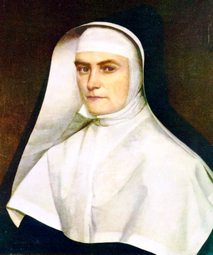Lives of the Saints
Our Models and Protectors
Spiritual Bouquet:
May 23

Saint Joan Antide Thouret
Foundress
(1765-1826)
Born in the diocese of Besançon in November of 1765, Saint Joan Antide lost her pious mother when she was 16 years old, and for several years took charge of the household and her family of younger brothers and sisters. After many hesitations, her father permitted her to enter the Congregation of the Daughters of Charity of Saint Vincent de Paul in Paris in 1787.
She worked in various hospitals caring for the sick, until the Revolution in France brought about the dispersion of the Congregations. She was ordered to abandon her religious habit in 1792, but refused and fled; she was struck so violently that she remained for eight months between life and death. In 1793 she returned from Paris to her native village of Sancey on foot, begging her bread; there she opened a school and cared for the sick.
Times were growing ever more difficult, and Sister Thouret again had to depart, this time journeying to Switzerland, where she assisted a French priest who had gone into exile with a few members of his little community. Again she cared for the sick; but the entire group was forced to move once again and go to Germany.
After two years she went to the village of Landeron in Switzerland. There she met the Vicar General of Besançon, and he asked her to found a school and a hospital in that city. In 1799 the foreseen school was opened at Besançon, and with a few novices the Foundress began work in France again.
She wrote a rule for her Daughters of Saint Vincent de Paul, as she called them to distinguish them from the larger group, the Sisters of Charity, of whom they were independent. The Congregation's members multiplied, as did their works; in 1802 they were given the direction of a house of detention at Bellevaux, sheltering more than 500 prisoners. They opened schools in eastern France and Switzerland. The foundress was invited to go to Naples to take on the direction of a hospital and initiate other works; she accepted this invitation in 1810.
She remained in Naples until 1818, obtaining from Pope Pius VII the approval of her Institute in 1819. Problems arising in Besançon caused her many sufferings, when the new bishop there desired to maintain the Community under diocesan authority. Saint Joan Antide died in Naples in 1826, having left for her Sisters many examples of heroic virtue. She was canonized in 1934 by Pope Pius XI, who invited the French nation to exult with joy on seeing its crown enriched by a new flower of holiness.
Almanach Catholique français pour 1927; pour 1934 (Librairie Bloud et Gay: Paris, 1927, 1934).